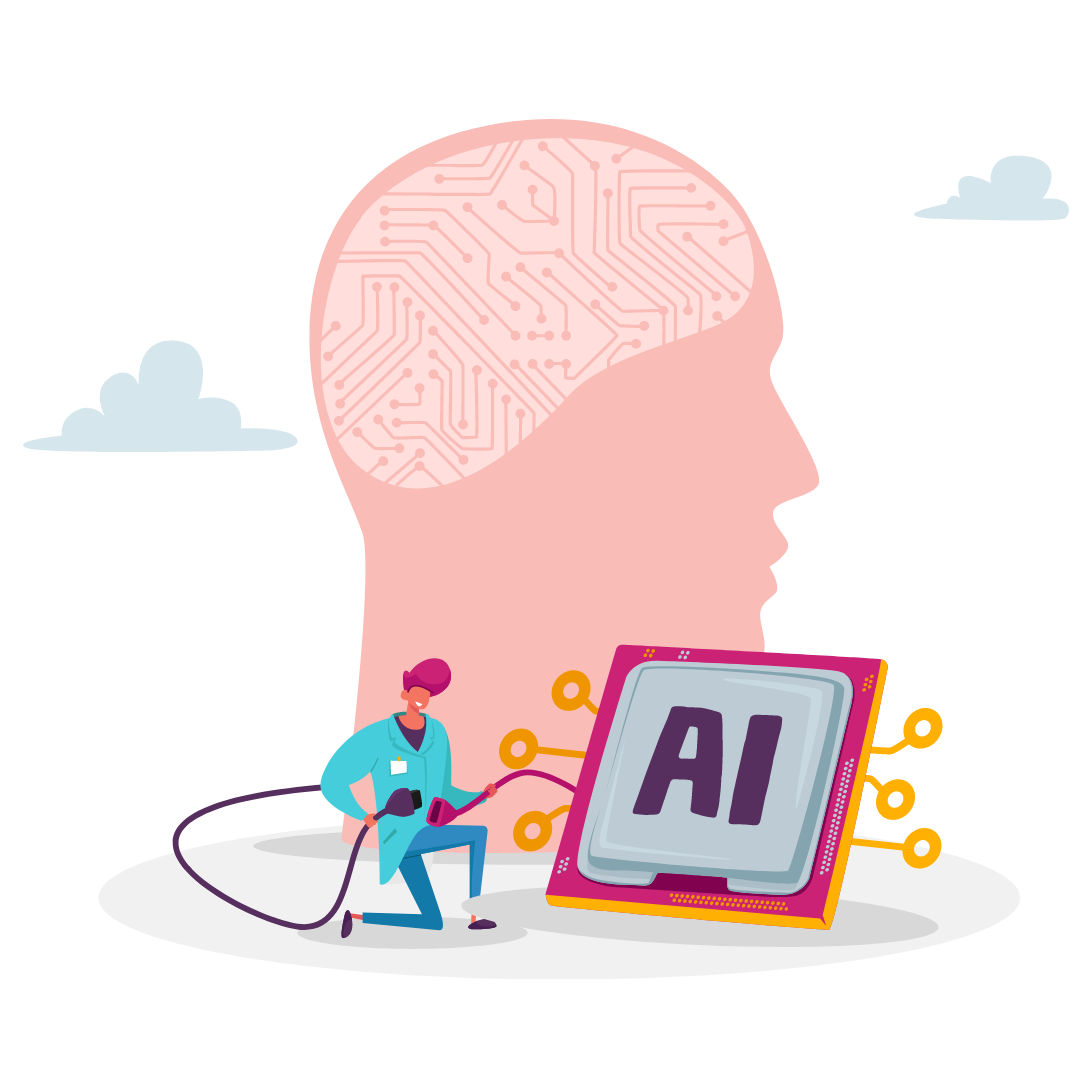
tRAINING
DATA SCIENCE & ARTIFICIAL INTELLIGENCE
AI equips you with powerful tools and techniques to tackle complex problems and find innovative solutions.





 Python for Data Science, Machine Learning, Artificial Intelligence, and Deep Learning
Python for Data Science, Machine Learning, Artificial Intelligence, and Deep Learning
 PySpark and Machine Learning
PySpark and Machine Learning
 Generative AI
Generative AI
 Python for Generative AI
Python for Generative AI
 Generative AI in Software Development
Generative AI in Software Development
 Generative AI for Software Testing and Test Automation
Generative AI for Software Testing and Test Automation
 Generative AI Course for Junior Engineers
Generative AI Course for Junior Engineers
 Generative AI Course for Senior Engineers
Generative AI Course for Senior Engineers
 Generative AI Course for Management
Generative AI Course for Management
Duration: 80 hours / 10 days
24 Lessons
This bootcamp is designed to provide participants with a comprehensive understanding of Python for various applications in data science, machine learning (ML), artificial intelligence (AI), and deep learning (DL). Participants will learn essential Python programming skills and explore libraries such as NumPy, Pandas, Scikit-learn, TensorFlow, and Keras to analyze data, build ML models, and develop AI applications.
This 10-day course outline provides a structured curriculum covering essential topics in Python for data science, machine learning, artificial intelligence, and deep learning. With a combination of lectures, hands-on exercises, and project work, participants will gain practical skills and experience to apply Python effectively in various domains.
DAY 1: INTRODUCTION TO PYTHON FOR DATA SCIENCE
Module 1: Introduction to Python Programming
Module 2: Data Manipulation with NumPy and Pandas
Module 3: Data Visualization with Matplotlib and Seaborn
Hands-on Data Analysis Project
DAY 2: ADVANCED DATA ANALYSIS TECHNIQUES
Module 1: Data Preprocessing and Cleaning
Module 2: Exploratory Data Analysis (EDA)
Module 3: Statistical Analysis with SciPy
Hands-on Data Analysis Project (Continued)
DAY 3: INTRODUCTION TO MACHINE LEARNING
Module 1: Introduction to Machine Learning
Module 2: Supervised Learning Algorithms
Module 3: Model Evaluation and Validation
Hands-on Machine Learning Project
DAY 4: ADVANCED MACHINE LEARNING TECHNIQUES
Module 1: Ensemble Learning Techniques
Module 2: Unsupervised Learning Algorithms
Module 3: Introduction to Deep Learning
Hands-on Deep Learning Project
DAY 5: INTRODUCTION TO ARTIFICIAL INTELLIGENCE
Module 1: Introduction to Artificial Intelligence (AI)
Module 2: Natural Language Processing (NLP)
Module 3: Introduction to Computer Vision
Hands-on AI Project
DAY 6 – 10: ADVANCED TOPICS AND PROJECT WORK
Module 1: Advanced Topics in Data Science and AI
Module 2: Project Work and Mentoring
Module 3: Project Work and Collaboration
Module 4: Project Presentations and Evaluation
Duration: 24 hours / 3 days
6 Lessons
DAY 1
Module 1: Introduction to Spark
Module 2: Resilient Distributed Datasets
DAY 2
Module 3: DataFrames
Module 4: Prepare Data for Modeling
DAY 3
Module 5: Introducing MLlib
Module 6: Introducing the ML Package
These courses are designed to provide participants with a comprehensive understanding of generative artificial intelligence (AI) techniques and algorithms.
Version 1 – View the Curriculum
Version 2 – View the Curriculum
Version 3 – View the Curriculum
Duration: 80 hours / 10 days
10 Lessons
Generative AI refers to a category of artificial intelligence models designed to generate new data similar to the data they were trained on. These models can create content across various domains, including text, images, music, and even code.
Day 1: Generative AI And Its Industry Applications
Day 2: Foundations of Python Programming
Day 3: Python Modules And Object-Oriented Programming
Day 4: Introduction to NumPy and Pandas For Data Manipulation
Day 5: Introduction to TensorFlow and Keras
Day 6: Understanding Generative Adversarial Networks (GANs)
Day 7: Variational Autoencoders (VAEs)
Day 8: Conditional GANs and VAEs
Day 9: Style Transfer and Image Generation
Day 10: Natural Language Processing (NLP) with Generative Models
Duration: 35 hours / 4 days
20 Lessons
This five-day course is designed for software developers who want to explore the applications of generative artificial intelligence (AI) in software development.
Participants will learn how to leverage generative AI techniques to automate tasks, enhance creativity, and streamline software development workflows.
By the end of the course, participants will be equipped with the knowledge and skills to apply generative AI techniques effectively in their software development projects.
Day 1: Introduction to Generative AI in Software Development
Day 2: Generative Models for Data Generation
Day 3: Text and Image Generation
Day 4: Advanced Generative Models
Day 5: Deployment and Integration
Duration: 48 hours / 6 days
12 Lessons
By the end of this course, participants will have gained a deep understanding of how generative AI can revolutionize software testing and test automation practices, enabling them to harness the power of AI to enhance the quality, efficiency, and reliability of their software products.
Module 1: Introduction to Generative AI in Software Testing
Module 2: Fundamentals of Software Testing
Module 3: Overview of Generative AI Techniques
Module 4: Generative AI for Test Data Generation
Module 5: Test Case Generation with Generative AI
Module 6: Fault Injection and Mutation Testing with Generative AI
Module 7: Test Oracle Construction Using Generative AI
Module 8: Enhancing Test Automation with Reinforcement Learning
Module 9: Challenges and Limitations of Generative AI in Software Testing
Module 10: Best Practices and Case Studies
Module 11: Hands-on Labs and Practical Exercises
Module 12: Conclusion and Future Directions
Duration: 16 hours / 2 days
6 Lessons
This course is designed for junior engineers who want to learn about generative artificial intelligence (AI) techniques and algorithms. Participants will gain a fundamental understanding of generative models and how they can be applied to generate new data samples, images, text, and other types of content. The course includes hands-on labs to provide practical experience in building and training generative AI models.
This two-day course provides a condensed yet comprehensive introduction to generative AI for junior engineers. Through a combination of lectures and hands-on labs, participants will gain a solid understanding of fundamental generative models and practical experience in building and training generative AI models using Python and popular deep learning frameworks.
DAY 1: INTRODUCTION TO GENERATIVE AI
Module 1: Overview of Generative AI
Module 2: Fundamentals of Probability and Statistics for Generative AI
Module 3: Introduction to GANs
Hands-on Lab: Building and Training a Simple GAN
DAY 2: ADVANCED GENERATIVE MODELS
Module 1: Variational Autoencoders (VAEs)
Module 2: Autoencoders and Variants
Module 3: Adversarial Autoencoders (AAEs)
Hands-on Lab: Training a Variational Autoencoder (VAE)
Duration: 14 hours / 2 days
6 Lessons
This course is tailored for senior engineers seeking an in-depth understanding of generative artificial intelligence (AI) techniques and algorithms.
Participants will delve into advanced generative models such as generative adversarial networks (GANs), variational autoencoders (VAEs), and autoregressive models. The course includes hands-on labs to provide practical experience in building and training sophisticated generative AI models.
This two-day course provides senior engineers with a deep dive into advanced generative AI concepts and techniques. Through a combination of lectures, hands-on labs, and discussions, participants will gain practical experience and expertise in building and deploying sophisticated generative AI models for various applications.
DAY 1: ADVANCED GENERATIVE MODELS
Module 1: Introduction to Generative AI
Module 2: Generative Adversarial Networks (GANs)
Module 3: Variational Autoencoders (VAEs)
Hands-on Lab: Building and Training GANs and VAEs
DAY 2: ADVANCED TOPICS AND APPLICATIONS
Module 1: Autoregressive Models and Beyond
Module 2: Conditional Generative Models and Style Transfer
Module 3: Advanced Applications of Generative AI
Hands-on Lab: Advanced Generative AI Applications
Duration: 8 hours / 1 day
4 Lessons
This one-day course is designed for managers and decision- makers who want to gain a high-level understanding of generative artificial intelligence (AI) techniques and their applications.
Participants will learn about the fundamentals of generative AI, its potential impact on business operations, and how to leverage generative AI technologies effectively in their organizations.
By the end of the course, participants will have gained a comprehensive understanding of generative AI concepts, applications, and strategic considerations.
They will be equipped with the knowledge and insights needed to effectively assess, plan, and implement generative AI initiatives within their organizations.
Module 1: Introduction to Generative AI
Module 2: Applications of Generative AI
Module 3: Generative AI Business Strategy
Module 4: Managing Risks and Ethical Considerations


